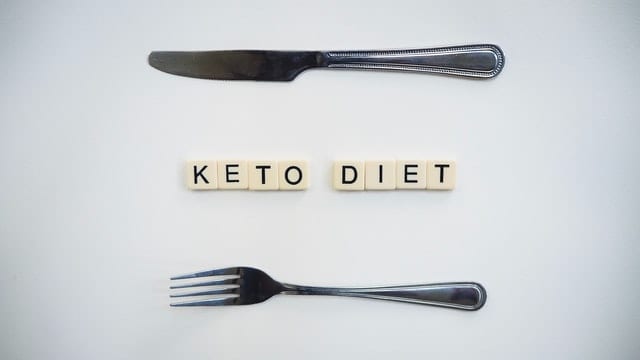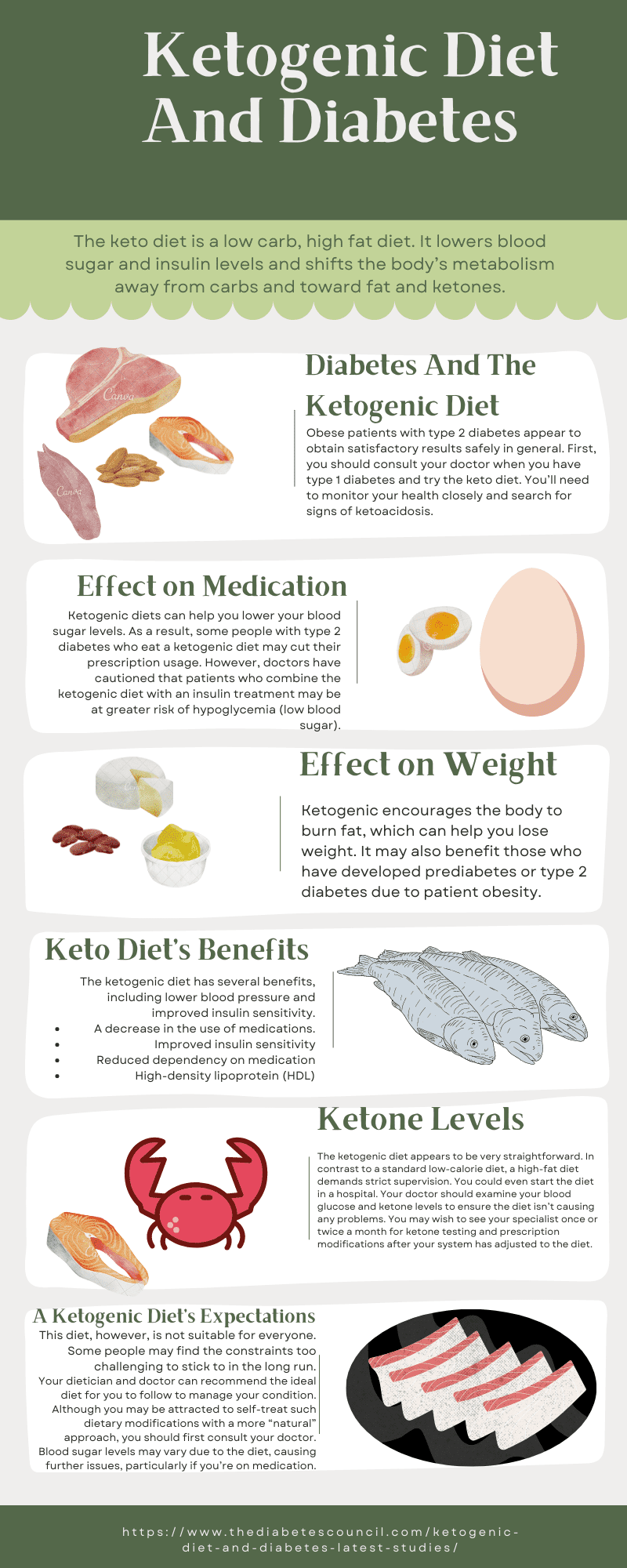
Diabetes is a well-known health problem. It is known for its reputation, not for its good deeds. People have been unsure about what to eat because of the numerous varieties and causes since many people believe a poor diet causes diabetes.
Contents
Although this is correct, it does not cover the complete spectrum of diabetes causative variables because additional causes can be physiological or pathological and are not always related to nutrition.
We'll look at the dietary reasons for diabetes in this piece, focusing on a type of diet known as ketogenic meals. These foods produce ketone bodies when they are broken down in the body. They have health benefits, but they also have downsides. Let's look at how diabetes responds to a ketogenic diet.
A Brief Knowledge of Ketone Bodies

Type 1 diabetes mellitus (also called insulin-dependent diabetes) is caused by a lack of -cells, which cannot reach their full potential to enhance glucose uptake by skeletal muscle, heart, and adipose tissue cells. As a result, after eating a carbohydrate-rich meal, blood glucose levels rise to dangerously high levels, a condition known as hyperglycemia. Because muscle and fat tissue cannot take up glucose, they rely on the fatty acids in stored triacylglycerols for energy.
Acetyl-CoA is metabolized in the liver to "ketone bodies" such as acetoacetate and -hydroxybutyrate, exported and transported to other organs for fuel (energy supply). When glucose isn't available, the brain uses ketone bodies as a backup fuel source. (Fatty acids are not fuel for brain neurons because they cannot penetrate the blood-brain barrier; therefore, the brain does not prioritize them as a source of energy.).
Untreated type 1 diabetes creates an accumulation of acetoacetate and -hydroxybutyrate in the blood, and the resulting drop in blood pH causes ketoacidosis, a potentially fatal condition. Insulin injection interrupts this series of events. GLUT4, which are insulin receptors in cells, enters the plasma membranes of hepatocytes and adipocytes, glucose is taken up and phosphorylated by the cells. Blood glucose levels fall, lowering ketone body formation dramatically.
Keto Diet

It may seem unusual that a high-fat diet is an option for type 2 diabetes patients because special diets for type 2 diabetes often focus on weight loss. The ketogenic (keto) diet, which is high in fat and low in carbs, has the potential to change how your body stores and uses energy, thereby alleviating diabetes symptoms.
The keto diet, as previously established, causes your body to burn fat for energy rather than carbohydrates. The diet was created nearly a century ago to treat epilepsy, but its effects on diabetes type 2 are currently being investigated.
The ketogenic diet has lower insulin requirements while increasing blood glucose (sugar) levels. The diet, on the other hand, is not without risks. Consult your doctor before making any significant dietary changes.
A high-fat diet may look counterproductive because many people with type 2 diabetes are overweight. The ketogenic diet promotes the body to use fat for energy instead of carbohydrates or glucose. The majority of the power in the keto diet comes from fat, with carbs accounting for only a tiny fraction of the diet.
On the other hand, the ketogenic diet does not imply a significant intake of saturated fats. Lipids that are good for your heart are essential for overall health. On the ketogenic diet, eggs are a healthy food that is frequently consumed. Fish includes salmon, cottage cheese, avocado, olives and olive oil, and almonds.
Diabetes And The Ketogenic Diet:

The ketogenic diet's impact on the type of diabetes becomes one of the most exciting parts of the ketogenic diet and diabetes connection. Obese patients with type 2 diabetes appear to obtain satisfactory results safely in general. First, you should consult your doctor when you have type 1 diabetes and try the keto diet. You'll need to monitor your health closely and search for signs of ketoacidosis. Working closely with your doctor is suggested for any type because your prescriptions may need to be adjusted.
What Effect Does It Have on Medication?

Ketogenic diets can help you lower your blood sugar levels. As a result, some people with type 2 diabetes who eat a ketogenic diet may cut their prescription usage. However, doctors have cautioned that patients who combine the ketogenic diet with an insulin treatment may be at greater risk of hypoglycemia (low blood sugar).
Hypoglycemia occurs when blood sugar levels fall below 70 milligrams per deciliter (mg/dL). Before making any dietary changes while on medication, it is best to discuss with your doctor. Not eating enough carbs when taking certain diabetes medications can be dangerous.
What Effect Does It Have on Weight?

Ketogenic encourages the body to burn fat, which can help you lose weight. It may also benefit those who have developed prediabetes or type 2 diabetes due to patient obesity. In those with diabetes, even light-to-moderate weight loss through food and exercise can help with glycemic management, overall well-being, and energy allocation throughout the day. According to studies, people who follow a ketogenic diet have better blood sugar management and lose weight.
The Keto Diet's Benefits

The ketogenic diet has several benefits, including lower blood pressure and improved insulin sensitivity.
- A decrease in the use of medications.
- Improved insulin sensitivity
- Reduced dependency on medication
- High-density lipoprotein (HDL), or "good" cholesterol, increased, but low-density lipoprotein (LDL), or "bad" cholesterol, remained unchanged.
You should be aware of a few unforeseen implications of the keto diet: Hypoglycemia: While the diet can help lower A1c levels, it can also put you at risk for hypoglycemia, especially if you're also on diabetes medication. Don't hesitate to get in touch with your doctor or diabetes educator if you decide to try the keto diet. They can advise you on keeping track of your blood sugar, taking your prescriptions, and what to do if your blood sugar drops too low.
The diet promotes a high-fat diet, which raises the risk of cardiovascular disease. Your cholesterol, particularly LDL, which is linked to heart disease, may rise if you consume too much saturated fat (found in foods like bacon and butter). Because diabetes increases the risk of heart disease, this is a significant issue for people with diabetes.
Ensure your fats come from healthier sources like avocados, almonds, olive, and canola oils, including mono- and polyunsaturated fats. Your LDL cholesterol and triglyceride levels may fall if you do it correctly. Consult your doctor if you take medication for cardiac problems, such as high blood pressure, to see whether your dosage has to be modified.
Nutrient deficiency: You may lose vital nutrients because many foods are off-limits, including fruits, vegetables, and dairy products. Consult a nutritionist familiar with nutritional ketosis to ensure your body receives the nutrients it requires.
Liver And Kidneys

Problems with the liver and kidneys include the following: These organs aid in the breakdown of fat and protein in your body. Some specialists are concerned that the keto diet may put them under too much stress. Others say that you should be fine as long as your organs are in good shape.
Constipation: You may be missing out on crucial fiber sources if you don't eat meals like whole grains and legumes.
Gallstones: Rapid weight loss makes you more likely to acquire gallstones. Some nutrients, such as fiber-rich foods and healthy fats, may assist you in avoiding them. Other measures to prevent gallbladder problems should be discussed with your doctor.
Dyslipidemia (low blood lipid levels) and an increase in hypoglycemic episodes are two other dangers.
According to certain animal studies, a low-carb diet, which often includes more fat, may raise the risk of cardiovascular disease (CVD) due to fat accumulation in the arteries. People with diabetes have a significant risk of cardiovascular disease than non-diabetics.
Low levels of an insulin-like growth factor, which can promote bone deterioration, can also cause delayed growth in children. When someone follows the keto diet, their bones become weak and prone to fractures. The keto diet's long-term safety and effectiveness are unknown, and researchers have urged for more primary studies and data before prescribing it.
Ketone Levels

The ketogenic diet appears to be very straightforward. In contrast to a standard low-calorie diet, a high-fat diet demands strict supervision. You could even start the diet in a hospital. Your doctor should examine your blood glucose and ketone levels to ensure the diet isn't causing any problems. You may wish to see your specialist once or twice a month for ketone testing and prescription modifications after your system has adjusted to the diet.
Even if your symptoms improve, it's vital to check your blood sugar levels regularly. Testing for type 2 diabetes is done on a case-by-case basis. Consult your doctor to determine the best testing strategy for your case.
Studies On the Ketogenic Diet and Diabetes in The Latest Years

In 2008, 24-week research was conducted to see how a low-carbohydrate diet affected type 2 diabetes and obesity. At the end of the research, those who followed a ketogenic diet reported better glycemic control and medication reduction improvements than those who followed a low-glycemic diet.
2013 study, a ketogenic diet can lead to more significant improvements in blood sugar control, A1c, weight loss, and insulin demand elimination than other diets. A 2017 study found that after 32 weeks, the ketogenic diet outperformed a typical low-fat diabetes diet in terms of weight loss.

A Ketogenic Diet's Expectations

Patients with type 2 diabetes who have trouble regulating their symptoms may find hope in the ketogenic diet. When diabetic symptoms are reduced, many people not only feel better but may also become less dependent on medications.
This diet, however, is not suitable for everyone. Some people may find the constraints too challenging to stick to in the long run.
Your dietician and doctor can recommend the ideal diet for you to follow to manage your condition. Although you may be attracted to self-treat such dietary modifications with a more "natural" approach, you should first consult your doctor. Blood sugar levels may vary due to the diet, causing further issues, particularly if you're on medication.





